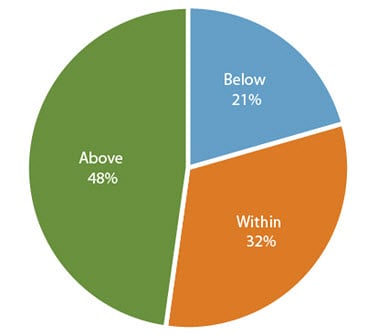Weight Gain During Pregnancy

The amount of weight you gain during pregnancy is important for the health of your pregnancy and for the long-term health of you and your baby. Learn about pregnancy weight gain recommendations and steps you can take to meet your pregnancy weight gain goal.
How Much Weight Should You Gain During Pregnancy?
How much weight you should gain during pregnancy is based on your body mass index (BMI) before pregnancy. BMI is a measure of body fat calculated from weight and height.
| If before pregnancy, you were… | You should gain… |
|---|---|
| Underweight BMI less than 18.5 |
28-40 pounds |
| Normal Weight BMI 18.5-24.9 |
25-35 pounds |
| Overweight BMI 25.0-29.9 |
15-25 pounds |
| Obese BMI greater than or equal to 30.0 |
11- 20 pounds |
| If before pregnancy, you were… | You should gain… |
|---|---|
| Underweight BMI less than 18.5 |
50-62 pounds* |
| Normal Weight BMI 18.5-24.9 |
37-54 pounds |
| Overweight BMI 25.0-29.9 |
31-50 pounds |
| Obese BMI greater than or equal to 30.0 |
25-42 pounds |
Healthy Weight Gain During Pregnancy from the Institute of Medicine. If you’re pregnant with triplets or more, talk to your health care provider about your weight gain goals.*All recommendations are from the Institute of Medicine, with the exception of underweight women with twins. Source: Luke B, Hediger ML, Nugent C, Newman RB, Mauldin JG, Witter FR, et al. Body mass index-specific weight gains associated with optimal birth weights in twin pregnancies. J Reprod Med. 2003; 48:217–24.
What Percentage of Women Had Pregnancy Weight Gain Within Recommendations?
A previous study found that only about one-third (32%) of women gained the recommended amount of weight during pregnancy and most women gained weight outside the recommendations (21% too little, 48% too much).
Percentage of Women with Pregnancy Weight Gain Below, Within, and Above Recommendations

For more information, please visit https://www.cdc.gov/mmwr/volumes/65/wr/mm6540a10.htm
Why Is It Important to Gain the Recommended Amount of Weight During Pregnancy?
Gaining less than the recommended amount of weight in pregnancy is associated with delivering a baby who is too small. Some babies born too small may have difficulty starting breastfeeding, may be at increased risk for illness, and may experience developmental delays (not meeting the milestones for his or her age).
Gaining more than the recommended amount of weight in pregnancy is associated with having a baby who is born too large, which can lead to delivery complications, cesarean delivery, and obesity during childhood. Gaining more than the recommended amount of weight can also increase the amount of weight you hold on to after pregnancy, which can lead to obesity.
For more information, healthcare providers can visit Healthy Weight and Weight Gain In Pregnancy: Behavioral Counseling Interventions
What Steps Can You Take to Meet Pregnancy Weight Gain Recommendations?

- Know your caloric needs. In general, the first trimester (or first three months) does not require any extra calories. Typically, women need about 340 additional calories per day during the second trimester (second three months) and about 450 additional calories per day during the third trimester (last three months).
- Work with your health care provider on your weight gain goals at the beginning of and regularly throughout your pregnancy.
- Track your pregnancy weight gain at the beginning and regularly throughout pregnancy and compare your progress to recommended ranges of healthy weight gain.
- Eat a balanced diet high in whole grains, vegetables, fruits, low fat dairy, and lean protein. Use the MyPlate plan to see the daily food group targets that are right for you at your stage of pregnancy. Most foods are safe to eat during pregnancy, but you will need to use caution with or avoid certain foods. Talk with your health care provider or visit Checklist of Foods to Avoid During Pregnancy for more information about food safety in pregnancy.
- Limit added sugars and solid fats found in foods like soft drinks, desserts, fried foods, whole milk, and fatty meats.
- Work up to or maintain at least 150 minutes (2 ⅟2 hours) of moderate intensity aerobic activity (such as brisk walking) per week. 150 minutes may sound overwhelming, but you can achieve your goal by breaking up your physical activity into 10 minutes at a time. Physical activity is healthy and safe for most pregnant women. Talk to your health care provider to determine if you have any physical activity restrictions. Visit Physical Activity for Healthy Pregnant or Postpartum Women for more information, or the Move Your Way® campaign for materials for during and after pregnancy.
- Tracker for women who begin a twin pregnancy underweight pdf icon[PDF – 778 KB]
- Tracker for women who begin a twin pregnancy at a normal weight pdf icon[PDF – 796 KB]
- Tracker for women who begin a twin pregnancy overweight pdf icon[PDF – 893 KB]
- Tracker for women who begin a twin pregnancy with obesity pdf icon[PDF – 833 KB]